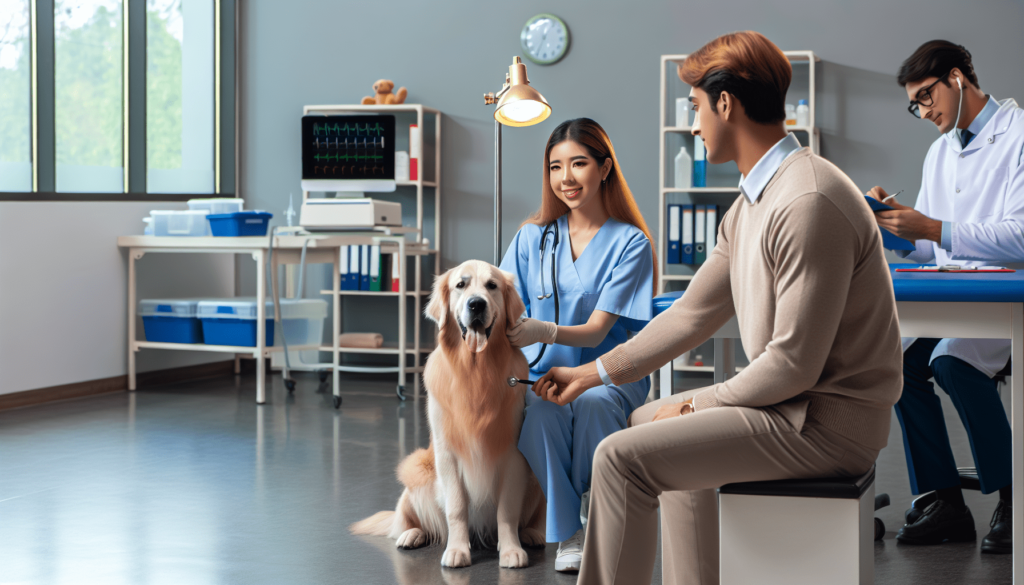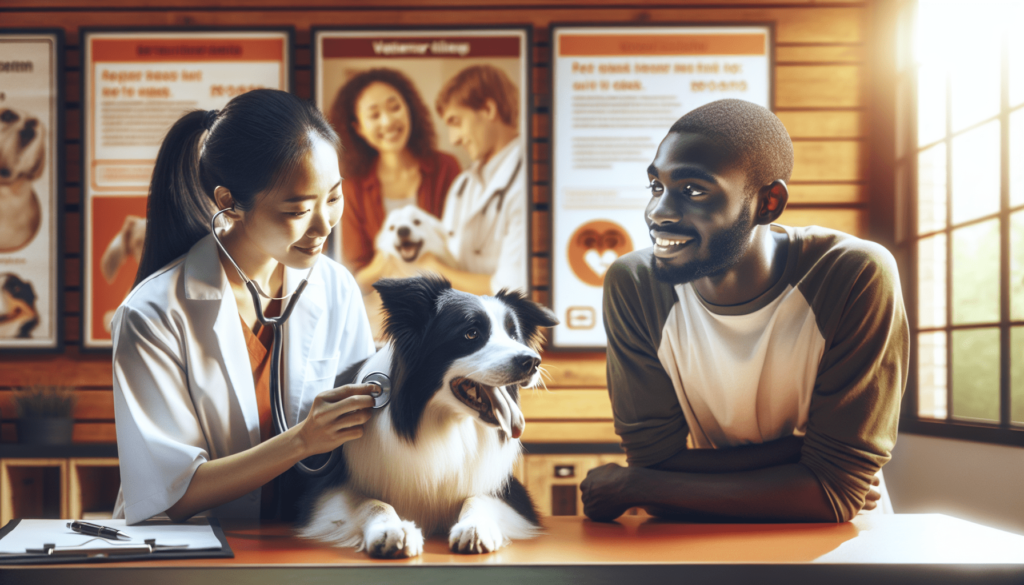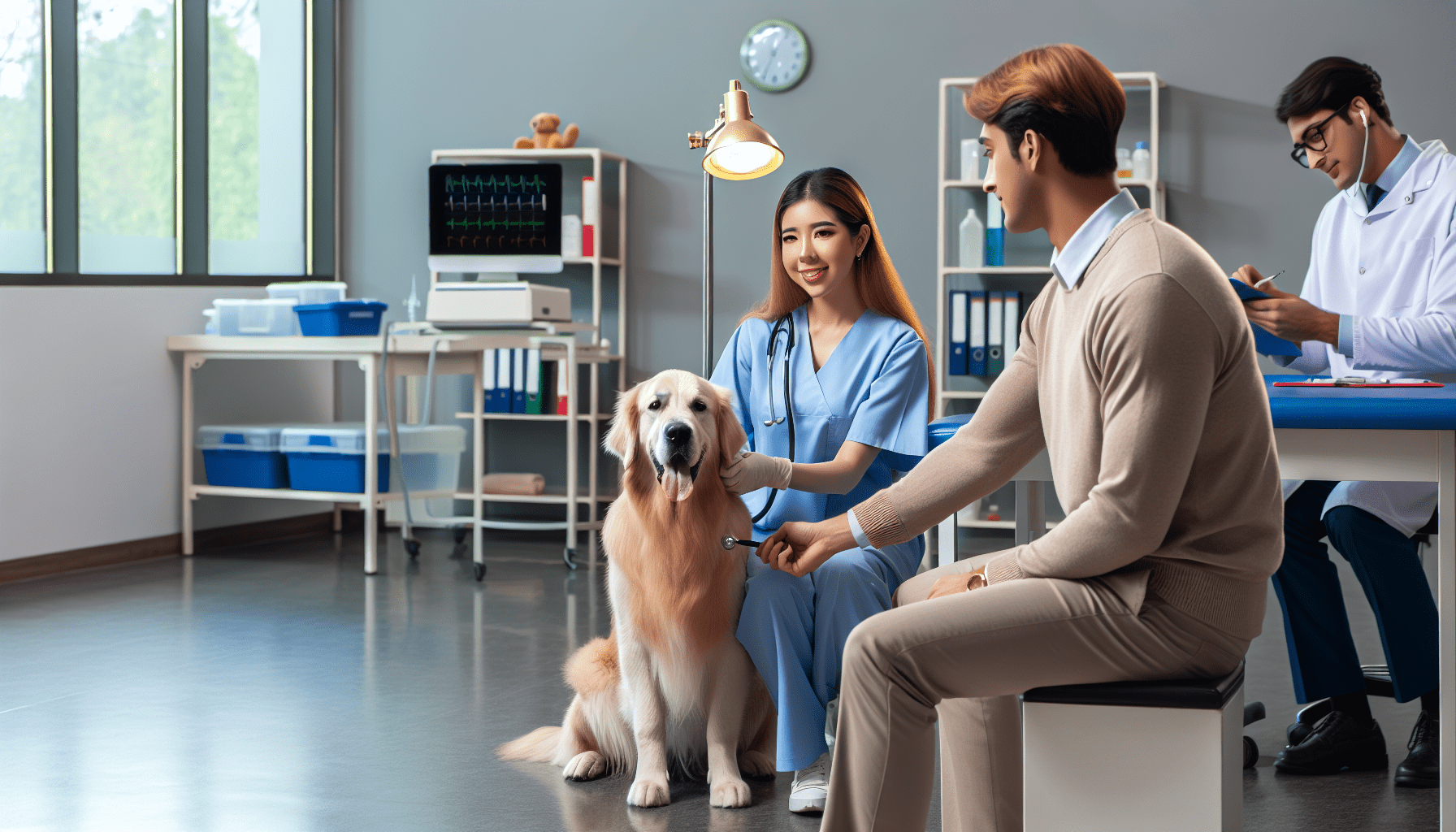Taking your furry friends to the vet for regular health checks is crucial in maintaining their overall well-being. Just like humans, pets require routine check-ups to ensure they are in good health and to detect any potential issues early on. These regular visits not only help prevent and manage diseases, but they also provide an opportunity for your veterinarian to assess your pet’s vital signs, weight, and overall condition. By prioritizing regular health checks for your pets, you are investing in their long and happy lives, giving them the best chance at a healthy future.
Preventive care
Regular health checks for pets are crucial for their overall well-being. By scheduling routine visits to the veterinarian, you are taking a proactive approach to your pet’s health. Preventive care involves early detection of health issues, prevention of diseases, and maintaining their overall health.
Early detection of health issues
One of the main benefits of regular health checks is the early detection of any potential health issues. By monitoring your pet’s vital signs, such as heart rate, breathing, and temperature, a veterinarian can identify any abnormalities that might indicate an underlying problem. This can lead to timely intervention and treatment, helping to prevent the issue from worsening.
Prevention of diseases
Another important aspect of preventive care is disease prevention. Through vaccinations, regular check-ups, and appropriate preventive measures, your pet can be protected against a range of infectious diseases. By staying up to date on vaccinations, you are not only safeguarding your own pet but also preventing the spread of diseases to other animals in the community.
Maintaining overall health
Regular health checks also play a vital role in maintaining your pet’s overall health. During these visits, the veterinarian can assess various aspects of your pet’s well-being, such as their weight, nutrition, dental health, and parasite control. By addressing these areas, any potential issues can be identified and addressed promptly, ensuring that your pet stays in the best possible health.
Detecting underlying conditions
Sometimes, your pet may display subtle signs of underlying health problems that are not immediately apparent. Regular health checks can help in identifying hidden health problems, allowing for early intervention and treatment.
Identifying hidden health problems
Pets can be masters at hiding signs of illness or discomfort. However, during routine health checks, a veterinarian can thoroughly examine your pet, looking for any signs of hidden health problems. This can include checking for abnormalities in their skin, coat, eyes, ears, and overall appearance. By catching these problems early, you can ensure that your pet receives the necessary treatment to prevent further complications.
Diagnosing chronic illnesses
For pets with chronic illnesses, regular health checks are essential for keeping their condition under control. Through periodic examinations and testing, a veterinarian can monitor the progression of the illness and make adjustments to the treatment plan as needed. This can help improve your pet’s quality of life and ensure they are receiving the appropriate care.
Detecting nutritional deficiencies
Nutrition plays a vital role in your pet’s overall health and well-being. During routine health checks, a veterinarian can assess your pet’s body condition score, which includes evaluating their weight and body composition. This allows for the early detection of nutritional deficiencies or obesity. By identifying these issues, the vet can recommend appropriate dietary changes or weight management plans to ensure your pet maintains a healthy weight and receives the necessary nutrients.

Providing appropriate vaccinations
Vaccinations are an essential part of preventive care for pets. Through appropriate vaccinations, you can protect your pet against various infectious diseases and prevent the spread of these diseases in the community.
Protecting against infectious diseases
Vaccinations are designed to stimulate an immune response in your pet, helping their body recognize and fight off specific diseases. By following a recommended vaccination schedule, you can ensure that your pet is protected against diseases such as rabies, distemper, parvovirus, and more. This helps keep your pet healthy and reduces the risk of them contracting and spreading these contagious diseases.
Preventing the spread of diseases
In addition to protecting your own pet, vaccinations also play a vital role in preventing the spread of diseases to other animals. Some diseases can be transmitted from pets to humans, highlighting the importance of keeping your pet’s vaccinations up to date. By vaccinating your pet, you are not only safeguarding their health but also contributing to the overall well-being of the entire pet population.
Ensuring pet’s well-being
Regular health checks provide an opportunity to discuss your pet’s specific vaccination needs with the veterinarian. They can help tailor a vaccination schedule based on your pet’s lifestyle, age, and risk factors. This ensures that the appropriate vaccines are administered, maximizing your pet’s protection against potentially harmful diseases.
Monitoring weight and nutrition
Maintaining a healthy weight and providing proper nutrition are vital for your pet’s overall health and well-being. Regular health checks allow veterinarians to monitor your pet’s weight, identify any nutritional deficiencies or obesity, and develop tailored diet and exercise plans.
Controlling pet’s weight
Just like in humans, obesity poses significant health risks for pets. During routine health checks, veterinarians can assess your pet’s body condition and weight, comparing it to the ideal range for their breed and size. If your pet is overweight or obese, the vet can provide guidance on appropriate weight management strategies, including diet changes and exercise recommendations. By taking proactive steps to control your pet’s weight, you can help prevent various health problems such as diabetes, joint issues, and heart disease.
Identifying malnutrition or obesity
While obesity is a common concern, malnutrition can also affect pets. During health checks, veterinarians can evaluate your pet’s body condition, coat quality, and overall appearance to identify any signs of malnourishment or nutritional deficiencies. If necessary, they can recommend dietary adjustments or supplements to ensure that your pet receives a balanced and nutritionally complete diet.
Tailoring diet and exercise plans
Just like humans, each pet’s nutritional needs and exercise requirements can vary. Regular health checks provide an opportunity to discuss your pet’s specific needs with the veterinarian. They can help tailor diet plans based on factors such as age, breed, activity level, and any specific health conditions. By following a customized diet and exercise plan, you can ensure that your pet maintains a healthy weight, gets the necessary nutrients, and enjoys optimal overall health.

Checking dental health
Dental health is crucial for your pet’s well-being and can have a significant impact on their overall health. Regular health checks include assessing your pet’s oral hygiene, preventing tooth decay and gum disease, and identifying any oral infections or tumors.
Preventing tooth decay and gum disease
Poor dental hygiene can lead to tooth decay, gum disease, and even systemic infections in pets. During routine health checks, veterinarians can examine your pet’s teeth and gums, looking for signs of plaque buildup, tartar, or inflammation. They may also perform a dental cleaning or recommend at-home dental care practices, such as toothbrushing or dental chews. By ensuring good dental hygiene, you can prevent painful dental issues and promote your pet’s overall well-being.
Identifying oral infections or tumors
In addition to tooth decay and gum disease, oral infections and tumors can also occur in pets. During health checks, veterinarians thoroughly examine your pet’s mouth, tongue, and gums, looking for any signs of infection, growths, or other abnormalities. Early detection of these issues is crucial for appropriate treatment and can help prevent further complications.
Maintaining overall oral hygiene
Regular health checks provide an opportunity to discuss your pet’s oral hygiene with the veterinarian. They can guide you on proper toothbrushing techniques, recommend dental products, and provide advice on maintaining your pet’s overall oral health at home. By incorporating good oral hygiene practices into your pet’s routine, you can contribute to their long-term dental health and well-being.
Ensuring parasite control
Parasites such as fleas, ticks, and worms can pose serious health risks to your pet. Regular health checks include assessing your pet’s parasite control needs, providing appropriate treatments, and preventing disease transmission.
Protecting against fleas, ticks, and worms
Fleas, ticks, and intestinal worms are common parasites that can infest pets and cause various health problems. During routine health checks, veterinarians can evaluate your pet’s exposure and susceptibility to these parasites. They can recommend appropriate preventive measures, such as topical treatments or oral medications, to protect your pet from infestations.
Treating infestations promptly
If your pet does happen to become infested with parasites, early detection and prompt treatment are essential. During health checks, veterinarians can identify any signs of flea infestation, tick bites, or worms. They can then prescribe the appropriate medications or treatments to eradicate the parasites and prevent further harm to your pet’s health.
Preventing disease transmission
Some parasites can transmit diseases to pets and even humans. Regular health checks allow for discussions about zoonotic diseases and the steps you can take to prevent them. Veterinarians can provide guidance on parasite control measures, including the use of preventive products, regular deworming protocols, and minimizing exposure to parasite-carrying environments. By ensuring effective parasite control, you are safeguarding your pet’s health and reducing the risk of disease transmission.
Managing aging-related issues
As pets age, they may face specific health challenges that require special attention. Regular health checks are vital for detecting age-related health problems, addressing mobility issues, and adapting care plans to meet the unique needs of senior pets.
Detecting age-related health problems
Aging can bring about various health issues in pets, such as arthritis, dental problems, cognitive decline, and organ dysfunction. Regular health checks provide an opportunity for veterinarians to monitor your senior pet’s health, perform relevant tests, and detect any age-related problems early on. With early detection, appropriate interventions can be implemented to manage these conditions and improve your pet’s quality of life.
Addressing mobility issues
Mobility problems are common in aging pets, particularly those with arthritis or joint-related issues. During health checks, veterinarians can assess your pet’s mobility, evaluate their gait, and identify any signs of pain or discomfort. They can recommend appropriate treatments, such as medications, supplements, physical therapy, or assistive devices, to help alleviate pain and improve mobility in senior pets.
Adapting care plans for senior pets
Senior pets often require specialized care to address their changing needs. Regular health checks provide an opportunity to discuss your pet’s specific requirements with the veterinarian. They can provide guidance on senior pet nutrition, exercise modifications, and environmental adjustments to ensure that your aging pet receives the appropriate care and support. By adapting care plans based on your pet’s individual needs, you can help them age gracefully and enjoy their senior years to the fullest.
Identifying behavioral concerns
Pets, like humans, can experience behavioral issues that impact their quality of life and overall well-being. Routine health checks allow for discussions about behavioral concerns, addressing anxiety or aggression, identifying signs of distress, and recommending appropriate behavioral training.
Addressing anxiety or aggression
Anxiety and aggression are common behavioral issues that can adversely affect your pet’s happiness and interactions with others. During health checks, veterinarians can evaluate your pet’s behavior, asking relevant questions and observing their reactions. They can provide guidance on managing anxiety or aggression, recommend behavioral modification techniques, or refer you to a professional behaviorist if necessary. By addressing these concerns, you can help improve your pet’s emotional well-being and foster a harmonious bond with them.
Identifying signs of distress
Pets often communicate through their behavior, and subtle signs of distress can indicate underlying physical or emotional discomfort. During routine health checks, veterinarians can observe your pet’s behavior for any signs of distress, such as excessive grooming, restlessness, changes in appetite, or unusual vocalizations. If any concerns are identified, the veterinarian can investigate further, recommend appropriate diagnostic tests, and develop a plan for managing your pet’s distress.
Recommending behavioral training
Regular health checks also provide an opportunity to discuss any training needs or behavioral challenges you may be facing with your pet. Veterinarians can offer advice on basic training, socialization, and management techniques to address specific behavioral issues. They can recommend reputable trainers or behaviorists who specialize in pet behavior modification. By seeking professional guidance and investing in behavioral training, you can enhance your pet’s behavior, strengthen your bond, and create a happier living environment for both of you.
Establishing a vet-pet relationship
Building a strong and trusting relationship between your pet and their veterinarian is essential. Regular health checks contribute to this relationship by familiarizing your pet with the veterinarian, creating a comfortable environment, and establishing routine care.
Building trust and familiarity
Pets may feel anxious or stressed during veterinary visits due to unfamiliar surroundings, strange smells, and unfamiliar faces. However, by scheduling regular health checks, your pet becomes more familiar with the veterinary clinic, the staff, and the veterinarian themselves. Over time, this familiarity helps build trust, alleviates anxiety, and makes subsequent visits less stressful for your pet.
Creating a comfortable environment
Veterinary clinics strive to create a comfortable and pet-friendly environment. During health checks, veterinarians and the clinic staff work to ensure that your pet feels secure and at ease. They use gentle handling techniques and positive reinforcement to make the experience as stress-free as possible. This helps create a positive association with veterinary visits, contributing to your pet’s overall well-being.
Establishing routine care
By scheduling regular health checks, you establish a routine of care for your pet. This routine allows for consistent monitoring of their health and supports early detection of any problems. Regular visits also provide an opportunity to discuss any concerns or questions you may have with the veterinarian. By establishing this routine, you can provide your pet with the ongoing care and attention they need to lead a happy and healthy life.
Promoting responsible pet ownership
Regular health checks are not only beneficial for your pet’s individual health but also promote responsible pet ownership. By meeting legal requirements, preventing overpopulation, and being accountable for your pet’s health and well-being, you contribute to a healthier and happier pet community.
Meeting legal requirements
Depending on your location, there may be legal requirements for pet ownership, such as mandatory vaccinations or licensing. Regular health checks ensure that you stay up to date with these legal obligations, protecting both your pet and the community as a whole.
Preventing overpopulation
Pet overpopulation is a significant issue in many areas, leading to overcrowded shelters and euthanasia of unwanted animals. By responsibly scheduling and attending regular health checks, you can ensure that your pet is spayed or neutered, helping to prevent unplanned litters and further contributing to the problem of overpopulation.
Being accountable for pet’s health and well-being
As a pet owner, you have a responsibility to provide for your pet’s health and well-being. Regular health checks demonstrate your commitment to meeting this responsibility. By actively seeking preventive care, following through with recommended treatments, and being proactive in addressing any health concerns, you are taking ownership of your pet’s overall health and ensuring they receive the best possible care.
In conclusion, regular health checks for pets are essential for their overall health and well-being. These visits contribute to preventive care, early detection of health issues, and the establishment of a strong vet-pet relationship. Through routine examinations, vaccinations, weight and nutrition monitoring, dental health checks, parasite control, and addressing age-related issues and behavioral concerns, you can provide comprehensive care for your pet. By promoting responsible pet ownership, you contribute to a happier and healthier pet community. So, make it a priority to schedule regular health checks for your pet and give them the best chance at a long, healthy, and fulfilling life.

